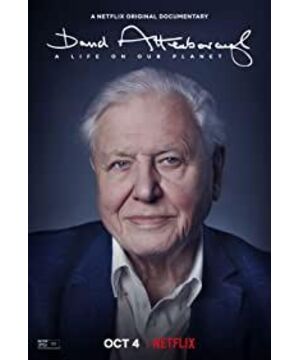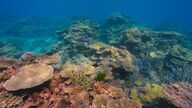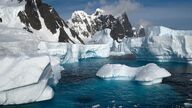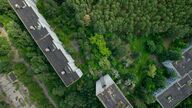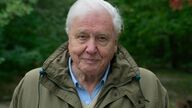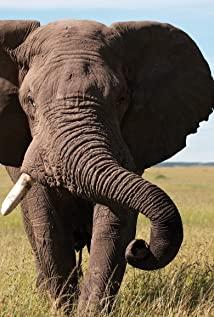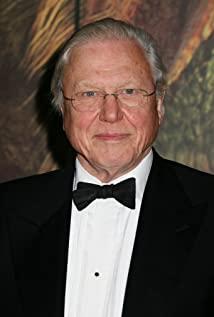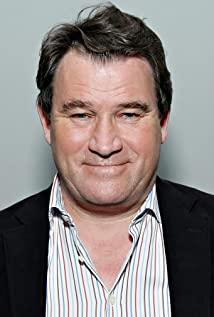I have not read many natural science books, and my interest in nature mainly comes from documentaries. The first nature documentary I consciously watched was David Attenborough's The Blue Planet, probably not long after I started learning how to get on and off my computer. Then there's Earth Pulse, Frozen Planet, and last year's Our Planet. It can be said that in terms of understanding of the natural world, David Attenborough is basically my enlightenment mentor.
David Attenborough was in his seventies at the time of "Blue Planet." For most people, this should have been a retirement age. And twenty years later, at the age of ninety-four, he made a documentary.
David Attenborough: A Life On Our Planet is one such documentary. Attenborough said at the outset that this was his own testimony to this era, to confirm how he himself had seen human activity affecting the entire natural world and ecosystems. He admits that he is lucky. In his golden age, he is fortunate to live in an era when the damage to the natural world by human activities has not been revealed, and the development of science and technology can help human beings to understand the world in a deeper way. So he traveled around the world, seen countless species, and took many precious images. Simply leaving these images is already a precious treasure. And it is precisely because he has seen too much that he is more and more aware of how human activities are destroying the entire ecosystem, and he also realizes that he must come out and do something to warn the world. Even if all these consequences will not affect him personally, yes, the most serious consequences are not of this generation, he is already ninety-four years old, all the consequences of all these will not affect him, he is old You can wait quietly to retire with the honor of life, and then stand in the Hall of Fame.
And his testimony was shocking. Simply telling the data, it is difficult for people to intuitively feel what the results of these actions are. For example, tell us that the carbon content of the atmosphere has risen from 280ppm in 1937 to 415ppm in 2020, and you won't be very intuitive about it. Therefore, the way of using images is even more touching.
"Blue Planet" was filmed around the millennium and premiered in 2001. Humans at that time had a relatively shallow understanding of climate change. For most people, climate change was an issue among scientists, a distant concept or warning. David Attenborough said that they accidentally discovered a very wonderful phenomenon when they were photographing the blue planet, that is, the bleaching process of coral. At first, they thought it was some wonderful natural phenomenon, and they thought the scene was beautiful, and then suddenly realized that it was the process of coral dying. The pure white corals they observed were nothing but the skeletons of dead corals. The direct cause of coral bleaching comes from rising ocean temperatures. Before this, climate experts have warned of the consequences of the endless burning of fossil fuels and carbon emissions, but the death and extinction of such a direct result is still shocking.
Another painful scene for countless people came from "Our Planet" in 2019. Yes, it was the scene where the walrus could only climb up a cliff due to climate warming, and then fell from the cliff and died. When this scene was broadcast at the 2019 World Davos Forum, all the guests in the audience showed their heartbroken expressions.
And these shots are just a microcosm of the destruction of the entire ecology by human beings. On a global scale, in every corner, every minute, every second, similar scenes are being staged. Orangutans in the Borneo rainforest, humpback whales in the South Pacific, and countless fires in the Amazon rainforest. All creatures that have not yet been discovered by man are suffering the results they should not have suffered.
When the diversity of species is rich enough, local damage will bring about natural repairs. However, this kind of repair is not endless. The damage to the entire ecosystem is a chain, which means that all results will eventually be reversed. human beings themselves. When the entire natural system can no longer withstand all this damage, the entire ecology will collapse in a short period of time. Just like climate warming, this phenomenon is not just the result of these two decades, but the endless burning of fossil fuels and carbon emissions since the industrial age, except that most of the results of the past hundred years have been caused by oceans. It has been endured, and now the ocean is on the verge of its limit, so human beings perceive all of this from a somatosensory perspective.
I watched this film with infinite guilt and pain, and cried the whole time. In fact, this mood has become more and more obvious when watching nature documentaries in recent years. When I watched documentaries in my early years, I would admire the wonders of nature with infinite curiosity and respect, and secretly hope that one day I will be able to experience these miraculous sights in person. And when I look at it again in the past two years, I will realize that those miracles are being destroyed, are going away, and even some scenes will only remain in the lens forever.
Of course, each individual has his own choice. I am not writing this as a call to everyone to do something. Like don't eat meat? Like no plastic bags? Like no electricity? From a utilitarian point of view, suicide is the most resource-efficient behavior, but it is impossible. All I want to say is that no one can get themselves out of this disaster, because everyone is responsible for all these actions, and it is every life who ultimately bears all the results. So I hope you can still watch this film, and then you can think about what kind of mentality you should have to recognize the relationship between your behavior and the natural world. Then see if you can do something from your own resources and perspective.
David Attenborough is ninety-four years old, and he is still running for a next generation that has nothing to do with him, and we can think about something.
View more about David Attenborough: A Life on Our Planet reviews


